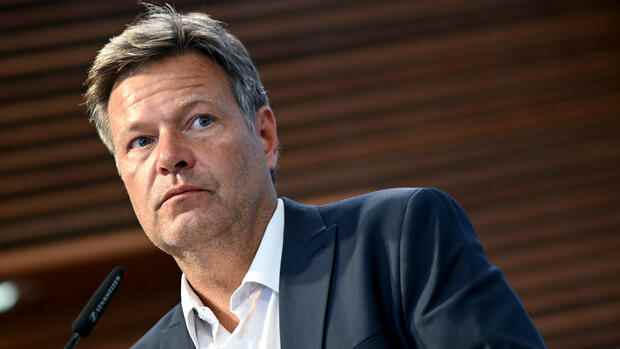Berlin At the beginning of the year, the traffic light coalition appeared to be solid. With a different vigor and new spirit, the SPD, Greens and FDP wanted to do many things differently from the previous government as a “progressive coalition”. Above all, it should be less conflictual.
FDP parliamentary group leader Christian Dürr spoke at the time of the team spirit from the coalition negotiations, which was taken into government. “In contrast to the previous Union-led grand coalition, the traffic light is based on fair and trusting cooperation,” he said. Even if it sometimes jerks during the voting processes.
In the meantime, however, there is not much to see of fair and trusting cooperation. For weeks, the SPD, Greens and FDP have been tangled up in the details of further aid for citizens in view of the enormous additional costs resulting from the energy crisis. Particularly controversial: The gas levy devised by Economics Minister Robert Habeck (Greens).
SPD leader Lars Klingbeil accused Habeck of technical errors because companies that do not need it economically also benefit from this levy on private households and industry. Instead of “nice words”, Klingbeil called for corrections and a policy with substance.
Top jobs of the day
Find the best jobs now and
be notified by email.
The Greens reacted angrily to the attacks on Habeck. Above all, close confidants of the minister did not leave a good word to the SPD and Olaf Scholz.
Sharp Green criticism of the SPD and Chancellor Scholz
Green Group Vice President Konstantin von Notz wrote on Twitter: “The Chancellor’s poor performance, his lousy poll numbers, memory gaps at Warburg and his responsibility at Nord Stream 2 will not be cured by disloyal behavior and resentment in the coalition.” He played with it, among other things to the debate about the role of Hamburg’s former mayor in the Cum-Ex affair.
Jan Philipp Albrecht, head of the Heinrich Böll Foundation, added: While Habeck and Foreign Minister Annalena Baerbock “are committed to the country, have been doing crisis management in the best sense of the word for months and are thus keeping the traffic lights on course, the SPD and their chancellor are trying to do their own thing to top up bad poll numbers with cheap populism. It will not work like that.”
But not only the SPD now sees Habeck as responsible. The FDP also considers the gas levy to be a “misdesign”. Group leader Dürr immediately demanded corrections before the government meeting this Tuesday.
For the Bremen political scientist Lothar Probst, conflicts between the coalition members are not unusual in what he calls a “coalition democracy” – especially at the end of a period of government when the partners want to differentiate themselves more strongly from each other. In this respect, it is “rather unusual” that conflicts come to light at such an early stage of the traffic light coalition, Probst told the Handelsblatt.
>> Read here: “A wave of lawsuits cannot be ruled out” – The legal pitfalls of the gas surcharge
Especially when one of the partners can position itself better than the others, the arguments become sharper. “SPD and FDP look enviously at the Greens, who are far ahead of them in the polls,” explained the politics professor.
Political scientist: “People will continue to try to pull themselves together”
However, Probst does not believe that the traffic light will break in the dispute over the gas levy or other controversial issues. “None of the traffic light partners will risk a coalition break in the middle of a crisis development,” he said. “One will continue to try to pull oneself together – if necessary with compensation deals or formula compromises.”
In the case of the gas levy, Habeck has announced corrections. “We will solve the problem,” he said on ZDF. However, his ministry did not initially provide any information as to when a solution would be presented. “I can’t give any more details about the schedule at the moment,” said a ministry spokeswoman.
However, time is pressing. Because it is to be expected that the additional energy costs will ultimately result in a large minus for many people. In addition, the mood among the population is increasingly heated – which is shown by boos and heckling at public events by Habeck and Lindner.
According to a recently published survey by the opinion research institute Insa for “Bild am Sonntag”, 62 percent of citizens are dissatisfied with the work of Chancellor Scholz, and 65 percent rate the work of the federal government negatively. The numbers have deteriorated significantly since the beginning of March.
Friedrich Merz: “The traffic light should provide orientation and show responsibility”
For political scientists Probst, the reasons are obvious. “Scholz lets a lot go,” he said. Not only that he himself often does not specify the direction of the traffic light clearly enough, he is also overshadowed by his Vice Chancellor Habeck, “who can explain and set directions much better than he can”.
The opposition’s verdict on government work is correspondingly clear. Union parliamentary group leader Friedrich Merz (CDU) said: “The traffic light should provide orientation and show responsibility. Unfortunately, none.” Right now, “a determined federal government for clarity in uncertain times” is needed.
The Union parliamentary group leader says that right now “a determined federal government is needed for clarity in uncertain times”.
(Photo: dpa)
From the point of view of the politics professor Probst, the leaders of the three traffic light parties “must find a modus vivendi as soon as possible to calm the conflicts and find a common course”. That could happen informally between Chancellor Scholz, Vice Chancellor Habeck and Finance Minister Christian Lindner. But of course also within the framework of the coalition committee, in order to involve the party leaders.
More: Industry warns of massive damage from short-term gas shutdowns
